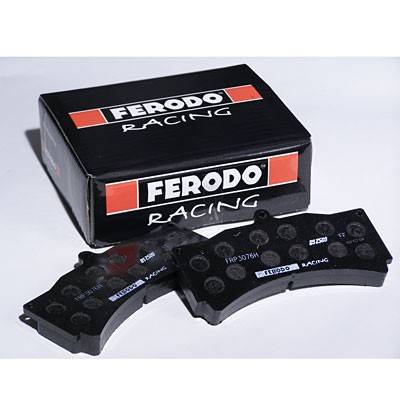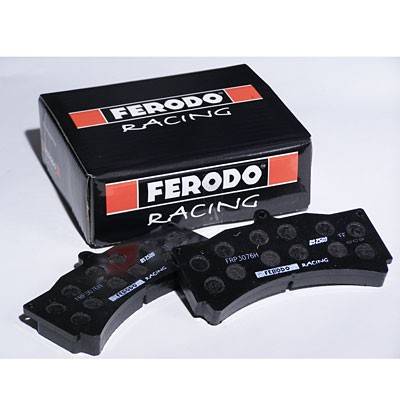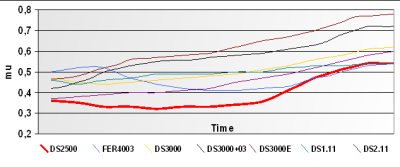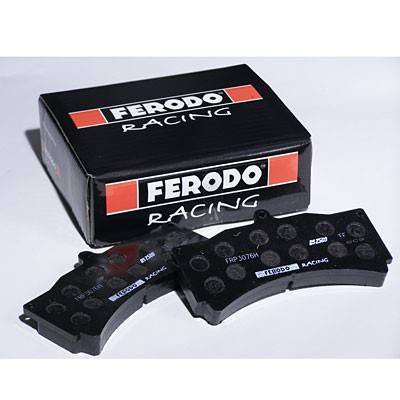Ferodo DS3000 FRP1077R
FRP1077R
DS3000 is one of the most decorated race pads in the global motorsports market, having won in diverse venues from rally to open wheel cars. The DS3000 has high bite and good fade resistance. It has a slightly rising torque curve, which means that as temperatures go up, bite increases slightly. Although the bite of the DS3000 is slightly higher than the DS1.11, wear rates are also higher. If you are doing extended lapping (30 minute+ sessions) or endurance racing, and are concerned about pad wear rates, the DS1.11 is probably the better choice for you.
(Ferodo compound code R)
DS3000 is the FERODO RACING compound that has set the braking standard from race one back in the 1998 season. DS3000 has contributed to countless wins and podium positions in many Touring car and GT championships around the world. In addition to its reduced bedding in time (approximately 50 percent quicker than other materials),
WARNING: DS3000 IS NOT SUITABLE FOR ROAD
(Ferodo compound code R)
DS3000 is the FERODO RACING compound that has set the braking standard from race one back in the 1998 season. DS3000 has contributed to countless wins and podium positions in many Touring car and GT championships around the world. In addition to its reduced bedding in time (approximately 50 percent quicker than other materials),
WARNING: DS3000 IS NOT SUITABLE FOR ROAD
Pricing:
$395.57
Description
The main characteristics of DS3000 are:
Very High coefficient of friction (0,54) at all speeds and temperatures
High initial bite
Predictability and control because of the unvarying torque output
Low off-brake drag
When using DS3000 on lighter racing cars lower brake pressures will be required to achieve the required deceleration.
All part numbers in the range feature a suffix. This suffix identifies the material compound available for each part number. Many part numbers are available in more than one material and are therefore listed accordingly on our website with different suffixes as explained below:
H = DS2500
C = 4003
R = DS3000
M = DS3000 Plus 03
E = DS3000 Endurance
W = DS1.11
X = DS2.11
Technical Specifications
Manufacturer Part # FRP1077R
FMSI #
Composition Semi-metallic
Category Full Race
Max Operating Temp 1400*F
Dust High
Noise Moderate
Bite/Mu High to Very High
Judder/Vibration Low
Pad Wear Moderate to High
Rotor Wear Low to Moderate
FMSI #
Composition Semi-metallic
Category Full Race
Max Operating Temp 1400*F
Dust High
Noise Moderate
Bite/Mu High to Very High
Judder/Vibration Low
Pad Wear Moderate to High
Rotor Wear Low to Moderate
Bedding & Installation
Please follow your vehicle service manual for installation instructions, or have the work performed by a qualified technician.
Ferodo's recommended bedding procedure:
During manufacturing, all Ferodo racing products are subject to “chemical bedding” to stabilize the materials and resins used in construction of the pad. Although this “prebedding” is an effective method and sufficient for low temperature use, the ultimate results are achieved by actual bedding on either the car or dyno...
How ? ...
This subjects the pad to the correct heat and torque loads seen in race conditions. These methods transfer pad material into the face of the rotor leaving a “transfer film” the friction generated between the pad face and this transfer film determines the performance of the “bite”. Correct bedding also ensures that materials which may become compressible are stabilized with the heat and pressure to avoid a “spongy pedal”.
Why? ...
When bedding in the car always try to bed on used rotors. If bedding on new rotors follow the rotor bedding instructions of the manufacturer, as it is important to heat cycle them first before bedding the pads. After fitting the new pads prepare the car by blocking off 50 percent of the brake cooling / air ducts to speed the “heat up time”. When leaving the pit lane apply brake gently at low speed to ensure pads are fitted correctly, build up temperature progressively to approx 350° C (670° F). This enables the heat to distribute around all areas of the pad.
When brakes are at suitable temperature begin bedding process, achieve approximately 70 percent of race speed then perform 25-30 brake applications at half normal race pedal pressure holding on for 4 seconds. When this is completed use a slowing down lap to allow brakes to cool. Return to the pit lane and allow pads to cool completely, check rotor appearance. Transfer film should be constant around rotor face, any “patchy” deposit will result in brake pedal judder. The use of temperature paint on rotors enables more accurate bedding procedures.
Ferodo's recommended bedding procedure:
During manufacturing, all Ferodo racing products are subject to “chemical bedding” to stabilize the materials and resins used in construction of the pad. Although this “prebedding” is an effective method and sufficient for low temperature use, the ultimate results are achieved by actual bedding on either the car or dyno...
How ? ...
This subjects the pad to the correct heat and torque loads seen in race conditions. These methods transfer pad material into the face of the rotor leaving a “transfer film” the friction generated between the pad face and this transfer film determines the performance of the “bite”. Correct bedding also ensures that materials which may become compressible are stabilized with the heat and pressure to avoid a “spongy pedal”.
Why? ...
When bedding in the car always try to bed on used rotors. If bedding on new rotors follow the rotor bedding instructions of the manufacturer, as it is important to heat cycle them first before bedding the pads. After fitting the new pads prepare the car by blocking off 50 percent of the brake cooling / air ducts to speed the “heat up time”. When leaving the pit lane apply brake gently at low speed to ensure pads are fitted correctly, build up temperature progressively to approx 350° C (670° F). This enables the heat to distribute around all areas of the pad.
When brakes are at suitable temperature begin bedding process, achieve approximately 70 percent of race speed then perform 25-30 brake applications at half normal race pedal pressure holding on for 4 seconds. When this is completed use a slowing down lap to allow brakes to cool. Return to the pit lane and allow pads to cool completely, check rotor appearance. Transfer film should be constant around rotor face, any “patchy” deposit will result in brake pedal judder. The use of temperature paint on rotors enables more accurate bedding procedures.
Details
- FRP1077R
- FRP1077R
- Ferodo
- New
Categories
Shipping Information
- Item Requires Shipping
- 6.5 lbs.
- W4.0000” x H3.0000” x L6.5000”
- Free FedEx / UPS Ground Shipping!
Customer Reviews
 Total Reviews (0)
Total Reviews (0)
You must login to post a review.







Write the First Review!